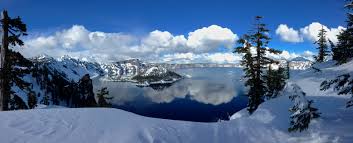The Crater Lake National Park......worl deepest and beautiful lake

The natural history of the park.
Crater Lake National Park is located in southern Oregon on the crest of the Cascade Range, 100 miles from the Pacific coast


Welcome to Crater Lake National Park
Getting There
The closest major airport is Eugene Airport which is 120 miles Northwest of the park.
There is an airport at Klamath Falls, OR which is 60 miles South of the park.
There is an airport at Medford, OR which is 80 miles Southwest of the park.
From the North
Take I-5 South to Eugene, OR take Stateroad 58 East to Highway 97 to Stateroad 138 to the park.
Take I-5 South to Roseburg, OR take Stateroad 138 East to the park’s north entrance.
From Roseburg, OR – Stateroad 138 East to the park’s north entrance.
From Bend, OR – Highway 97 South to Stateroad 138 west to the park’s north entrance.
*The park’s north entrance is typically closed for the winter season from mid-October to Mid-June.
From the South
Take I-5 North to take Stateroad 62 North to the park’s west entrance or to Stateroad 230 North to Stateroad 138 to the north entrance.
From Klamath Falls, OR – Highway 97 North to Stateroad 62 North to the park’s south entrance.
From the West
Head for I-5 North or South and follow the North and South directions to the park.
From the East
Head for I-5 North or South or Highway 97 North or South and follow the directions for North or South to the park.
Establishment the Crater Lake National Park

President Theodore Roosevelt signed the bill on 22 May 1902 for Crater Lake National Park to become nation’s fifth oldest park.
Size and Visitation of Crater Lake National Park
Acreage – as of September 23, 2000
Federal Land – 183,223.77
Non-Federal Land – .28
Gross Area Acres – 183,224.05
Visitation – 1999
Total Recreation Visits – 417,992
About a half million people visit the park each year, with Jul and Aug being the busiest months.
History of Crater Lake National Park
The Klamaths revered the lake and the surrounding area, keeping it undiscovered by white explorers until 1853. That year, on June 12, three gold prospectors, John Wesley Hillman, Henry Klippel, and Isaac Skeeters, came upon a long, sloping mountain. Upon reaching its highest point, a huge, awe-inspiring lake was visible. “This is the bluest lake we’ve ever seen,” they reported, and named it Deep Blue Lake. But gold was more on the minds of settlers at the time and the discovery was soon forgotten.
Captain Clarence Dutton was the next man to make a discovery at Crater Lake. Dutton commanded a U.S. Geological Survey party which carried the Cleetwood, a half-ton survey boat, up the steep slopes of the mountain then lowered it to the lake. From the stern of the Cleetwood, a piece of pipe on the end of a spool of piano wire sounded the depth of the lake at 168 differnt points. Dutton’s soundings of 1,996 feet were amazingly close to the sonar readings made in 1959 that established the lake’s deepest point at 1,932 feet.
Hi! I am a robot. I just upvoted you! I found similar content that readers might be interested in:
https://www.national-park.com/welcome-to-crater-lake-national-park/